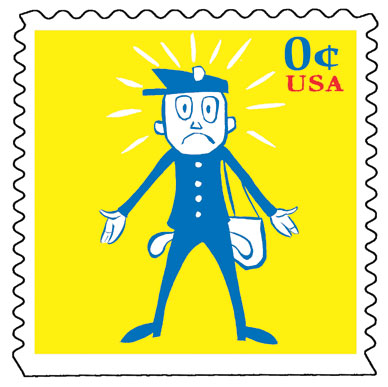 RYAN INZANA
RYAN INZANA
Like so many institutions, public and private, the United States Postal Service is facing a financial crisis of monumental proportions. To help it weather the storm, Postmaster General John Potter recently appealed to Congress to eliminate six-day delivery and restructure the accounting treatment of its long-term healthcare benefits. No prominent lawmaker so far has urged Congress to bail it out. Yet by almost any criteria, the Postal Service has a better claim on federal support than Bear Stearns or General Motors. For more than two centuries, postal policy has safeguarded civic engagement through administrative protocols so arcane that they almost never find their way into textbooks on constitutional law. This is unfortunate, since these protocols have long sustained the political journalism that is a bulwark of the Republic.
No republic can hope to endure without civic engagement informed by the political journalism of publications like The Nation. The best-known safeguard for the press is the First Amendment. Until the twentieth century, however, this constitutional provision had little practical import. Far more consequential, though far less heralded, were the institutional safeguards for the press that the founders enshrined in postal policy.
George Washington and James Madison had much to quarrel about in the 1790s. Yet they agreed that the low-cost circulation of periodicals in the mail promoted civic engagement in public affairs. Though postal policy subsidized all publications, large and small, it was structured to encourage small-circulation journals of opinion. Journalists like Horace Greeley supported preferential postal rates not only for large-circulation periodicals like his own New York Tribune but also for the many smaller publications that he believed the government had an obligation to sustain.
All this changed in 1970, when Congress established the Postal Service. No longer would Congress set postal rates and no longer was Congress the final arbitrator of postal policy. Authority over rate-making shifted from Congress to the Postal Service, while jurisdiction over postal policy devolved on the Postal Regulatory Commission (PRC) by virtue of its jurisdiction over the interpretation of postal law.
These shifts are reflected in a recently released PRC study of postal policy that Congress requested as part of a comprehensive overhaul of the Postal Service. The report proposes no radical innovations. It concludes that most Americans are satisfied with the level of postal service they currently receive and recommends no major changes in policy. More significant is what the PRC report leaves out. Nowhere does it address the media firestorm over the huge recent rate hikes for small magazines, and only in passing does it highlight the growing public dissatisfaction with the proliferation of advertising fliers known as junk mail–an issue with obvious environmental implications that is currently a hot topic in Europe, and that is also rapidly finding its way onto the public agenda in the United States.
Popular
"swipe left below to view more authors"Swipe →
Most significant, the PRC report affirms the post-1970 transformation of the rationale for the Postal Service. Gone is the broad, dynamic and open-ended civic mandate of the founders. In its place is a narrow, static and content-neutral legalism known as the “universal service obligation.” Before 1970 postal policy remained attuned to the needs of the citizenry; since 1970 it has become increasingly beholden to package carriers like FedEx, with which the Postal Service has contractual relations, and mass mailers like the media giant Time Warner, which rely on the Postal Service to deliver their magazines.
Why have we strayed so far from the intentions of the founders? PRC commissioners point to changes in the information infrastructure, including, predictably, the rise of the Internet. Postal executives, for their part, are preoccupied with the multibillion-dollar deficit that the Postal Service faced last year and is certain to confront this year as well.
Technology and economics are but part of the story. No less fundamental is the radical experiment in social engineering that has been recently undertaken by postal executives with the connivance of the PRC. The founders championed a flexible civic ecumenicalism highly favorable to newspapers and magazines. Postal executives and PRC commissioners, in contrast, have begun to embrace a rigid market fundamentalism that matches the cost a sender pays to mail an item with the cost of its delivery, with little regard for its content.
One milestone in the recasting of postal policy occurred in 2007, when lawyers and economists working for Time Warner persuaded the PRC to authorize a rate adjustment that permitted magazine publishers to retain a much larger share of the cost savings they had generated through the adoption of high-volume sorting, packaging and shipping techniques best suited for mass-circulation publications like People and Time. While ostensibly fair-minded, this ruling led to huge cost increases for more specialized magazines like The Nation and National Review, which proved unable to take advantage of these cost-saving techniques. This differential treatment occasioned a sharp protest from small magazines across the political spectrum. Victor Navasky at The Nation was incensed, and so too was Jack Fowler at National Review. And with good reason: the postage bill for The Nation and National Review increased overnight almost 20 percent; for many small magazines, the increase was even greater.
What is truly scandalous is not that Time Warner prevailed on the PRC to cut its mailing costs but that it failed to make common cause with the rest of the press and champion the institutional safeguards that have long sustained civic engagement. Let us hope that the incoming administration demonstrates a higher regard for the intentions of the founders by reaffirming the civic mandate of the Postal Service to promote the informed discussion of public affairs, a mandate that remains the most compelling justification for the monopoly privileges that the Postal Service has long enjoyed.


